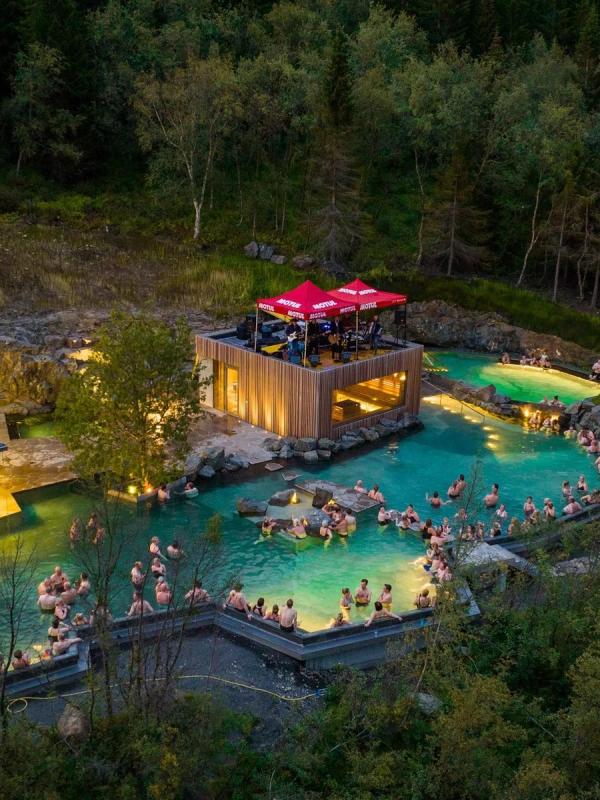
Relaxing in the North: Discovering the Forest Lagoon
One of the things Iceland is known for is its hot springs and geothermal baths. Many travelers come to this beautiful country in search of places where they can soak themselves in pure and warm waters, surrounded by astonishing natural beauty.
Many of these places are famous not only in the country but all over the world. The most famous of them all is, arguably, the Blue Lagoon, in the southwest of the country, not far from Reykjavik. But in recent years, a new contender has appeared and is now one of the best places to enjoy this activity: The Forest Lagoon.
Nestled in the serene landscapes of North Iceland, the Forest Lagoon (Skógarböðin in Icelandic) is a geothermal oasis that perfectly marries modern spa luxury with the untamed beauty of Icelandic nature.
Key Takeaways
- The Forest Lagoon opened in 2022, which makes it one of the youngest hot springs in Iceland.
- It's located in Eyjafjarðarsveit, only 3.6 km from Akureyri.
- It's close to many cool attractions, such as Godafoss or Dettifoss Waterfall.
What to Expect from the Forest Lagoon
Like many other hot springs and geothermal baths in the country, what's most appealing about the Forest Lagoon is the idea of soaking yourself in warm, mineral-rich waters while surrounded by impressive natural wonders. This natural spa is surrounded by the beautiful trees of Vaðlaskógur forest and the views that stretch out over the Eyjafjörður fjord.
The Forest Lagoon’s design is an exciting blend of natural elements and modern architecture. It features two main pools, both filled with geothermal waters that come from the nearby Vaðlaheiði mountain. The larger of the two pools offers a spacious area to relax, which also includes bars where you can enjoy a drink without leaving the warmth of the water. The smaller, hotter pool is perfect for those who prefer a more intense heat.
In addition to the pools, the Forest Lagoon also has a Finnish-style sauna, where you can sweat out toxins while contemplating the surrounding mountains. There’s also a cold pool, which provides a refreshing shock to the body. The contrast between the temperatures of the different pools is really good for your circulatory system.
The experience is rounded out with the Forest Bistro, a cozy spot where you can enjoy local Icelandic cuisine by a fireplace, or dine outside during the warmer months.
General Information & Useful Information About the Forest Lagoon
The Forest Lagoon covers a 1,300 square meter (14,000 square feet) area and can comfortably host up to 200 visitors at a time. It is open daily from 10 a.m. until midnight, allowing you to enjoy both the long summer days and the beautiful glow of the Northern Lights in winter.
Entrance Fees
- Adults: 6,900 ISK (45€ or 50$).
- Children (ages 6–15): 3,450 ISK (22.75€ or 25$).
- Seniors (67+) and disabled visitors: 5,250 ISK (34.50€ or 38$).
- Children under 5: Free.
The entrance fee gives you access to all the facilities, including the pools, sauna, and cold tub. Towels are not included but can be rented for a small fee. It’s important to book your visit in advance, especially during peak seasons, to make sure there’s availability.
Where’s the Forest Lagoon and How to Get There
The Forest Lagoon is located just 3.6 kilometers (2.2 miles) from Akureyri, the most important city in North Iceland. This proximity to Akureyri makes it easily accessible whether you're staying in town or just passing through on a road trip. If you’re driving from Reykjavik, the journey will take about five hours, covering roughly 391 kilometers (242 miles). The best way to get to this iconic place and to move around Iceland in general is to rent a car.
Things to See and Do Near the Forest Lagoon
While the Forest Lagoon is a destination in itself, the surrounding area offers plenty of attractions to explore. In fact, it’s just off the Diamond Circle, a looping scenic route that connects some of the best attractions in North Iceland. It’s similar to the famous Golden Circle, in Southern Iceland, but usually less crowded.
Akureyri
Known as the "Capital of the North," Akureyri is a vibrant town with a variety of cultural and historical sites. The Akureyri Museum offers insights into the town's history, while the Motorcycle Museum of Iceland showcases a unique collection of bikes and memorabilia. The Akureyri Botanical Garden is a must-visit for nature lovers, with a stunning collection of plant species that live in the Arctic climate.
It’s a great option to use as a base if you want to explore the Diamond Circle or the North in general. And it’s two minutes away from the Forest Lagoon.
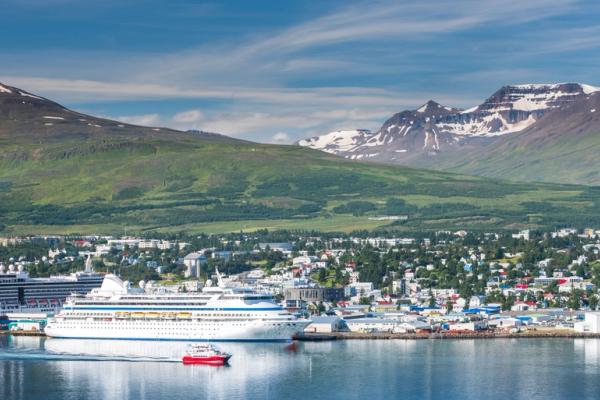
Goðafoss
A bit further east of Akureyri, we can find Goðafoss, or "Waterfall of the Gods," one of Iceland’s most spectacular waterfalls. The thing that usually strikes visitors the most is the beautiful turquoise color of the water. It’s also a place of historical importance for the country, as it was here where, in the year 1000, lawspeaker and local chieftain Þorgeir Ljósvetningagoði decided to convert to Christianity.
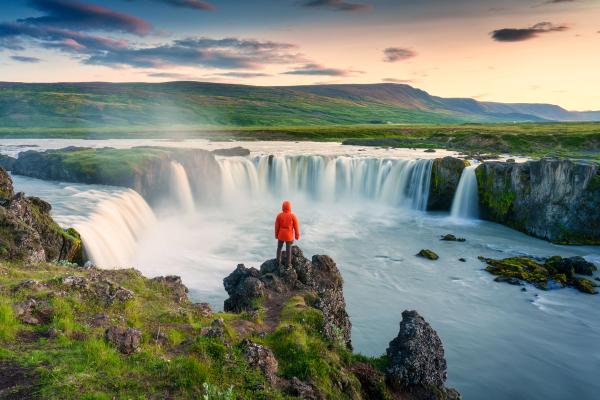
Lake Mývatn
The next stop we can make is Lake Mývatn, a stunning lake known for its unique volcanic landscape and rich birdlife. Nearby attractions include the Mývatn Nature Baths and the geothermal area of Hverir, where you can witness boiling mud pots and steam vents.
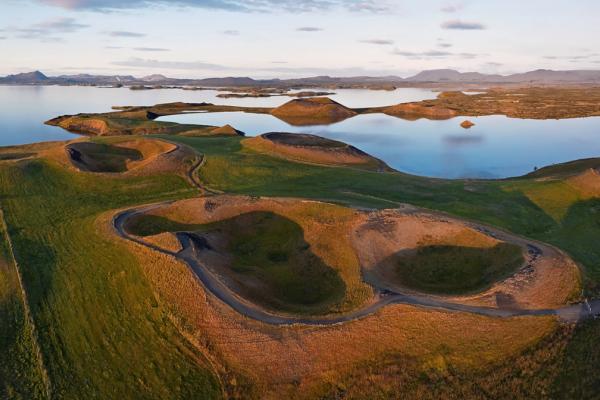
Dettifoss Waterfall
Not far from the Forest Lagoon, we can find Europe's second most powerful waterfall: Dettifoss. This waterfall is 45 meters high and 100 meters wide, and standing in front of it is a humbling experience.
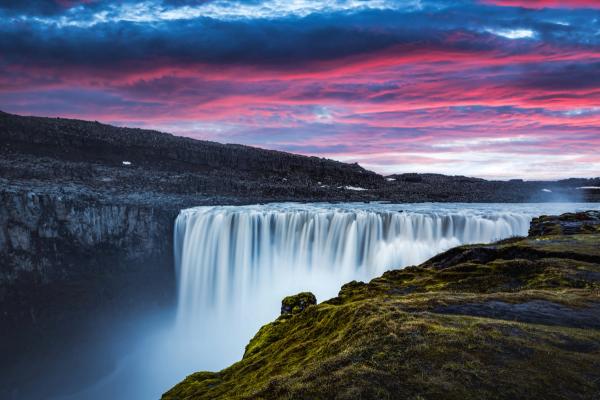
Ásbyrgi Canyon
You can also visit one of the most iconic natural wonders in Iceland: Ásbyrgi Canyon. This horseshoe-shaped canyon is also part of Norse mythology, as it is believed it was formed when Slepinir, Odin’s eight-legged horse, struck the land here with his hoof.
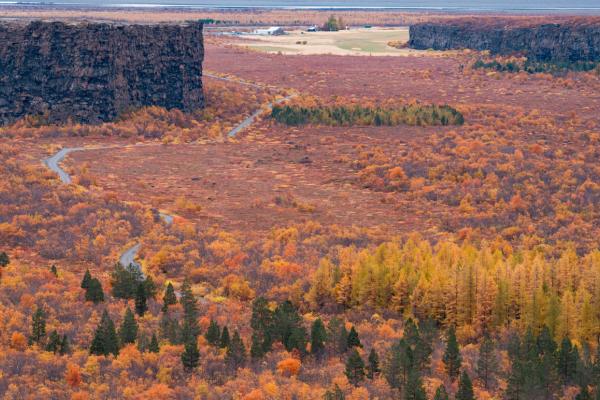
Husavik
If you want to go whale watching, the best place near the Forest Lagoon is the town of Húsavík, often called the “Whale Watching Capital of Iceland.” There are many tours departing from the town’s harbor in which you can see these creatures in their natural habitat.
These attractions make the Forest Lagoon a perfect base for exploring some of Iceland's most beautiful and less-traveled sites.
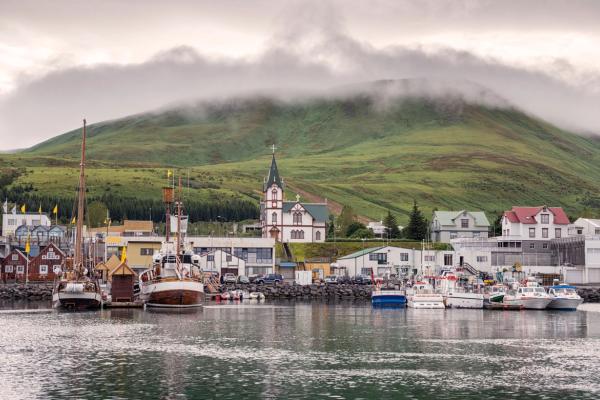
What's the Weather Like at the Forest Lagoon?
What makes the Icelandic weather famous is that it’s unpredictable and it changes constantly. Even within the same day you can experience completely different situations.
Summer (June to August)
Summers in Iceland are mild, with temperatures ranging from 10 to 15°C (50 to 59°F). The daylight hours are very long, especially by the end of June, which provides a lot of time to explore natural sites. The warm weather makes it ideal for outdoor dining at the Forest Bistro or enjoying a late-night soak in the lagoon.
Autumn (September and October)
This season brings cooler temperatures, ranging from 0 to 10°C (32 to 50°F). The landscape transforms with vibrant fall colors, making it a great time to visit the Forest Lagoon, as it’s surrounded by trees. In this season is when the phenomenon of the Northern Lights starts to occur.
Winter (November to March)
The north of Iceland is colder than the south and the west, and that can be felt in winter, with temperatures often below freezing. However, this is the best time to experience the Northern Lights, something that can improve the already amazing experience of the Forest Lagoon. And the feeling of having a relaxing bath in hot water while the temperature outside is really low is just fantastic.
Spring (April and May)
Spring is a transitional season with temperatures slowly rising from 0 to 10°C (32 to 50°F). The days grow longer, and the snow begins to melt, making nature come alive like no other time after the winter slumber. It's a quieter time to visit before the summer crowds arrive.
| Season | Temperature in ºF | Temperature in ºC |
| Summer (June to August) | 50 to 59°F | 10 to 15°C |
| Autumn (September and October) | 32 to 50°F | 0 to 10°C |
| Winter (November to March) | 23 to 41ºF | -5 to 5ºC |
| Spring (April and May) | 32 to 50°F | 0 to 10°C |
Travel Tips
- Booking: Always book your visit in advance to secure your spot, particularly during the busy summer months.
- Pack your swimsuit: Bring swimwear, a towel (or rent one on-site), and a water bottle to stay hydrated. Sunglasses are also a good idea for sunny days.
- Spa Etiquette: Icelandic spas have a strict policy on hygiene. Make sure to shower thoroughly before entering the pools.
- Cash-Free Zone: The Forest Lagoon operates a cashless system. You’ll be given a wristband upon entry that you can use to make purchases within the spa.
- Be winter-wise: If you’re visiting in winter, prepare for cold weather outside the pools. Bring warm clothing and be ready for icy roads if you’re driving.
Geothermal Culture in Iceland
Iceland is famous for its geothermal activity, which has shaped not only the landscape but also the culture. Geothermal spas like the Forest Lagoon are more than just places to relax—they are deeply rooted in Icelandic traditions. For centuries, Icelanders have learned how to use geothermal energy and apply it to their lifestyle. These places have also played a crucial role in socializing, as they are spots where people would gather and talk.
Today, these spas offer a communal experience where locals and visitors alike can unwind, interact, and even conduct business meetings, all while soaking in the healing waters.
The water in these spas is rich in minerals, particularly silica, and sulfur, which are believed to have beneficial effects on the skin. This, combined with the therapeutic contrast between hot and cold water, makes geothermal bathing a key component of Icelandic wellness culture.
Conclusion
The Forest Lagoon is more than just a place to take a warm bath. It’s a full experience that brings together the best of Icelandic nature, culture, and hospitality. One of the most recommended activities while visiting Iceland is getting to know its geothermal baths and hot springs, and there are not many better options than the Forest Lagoon.
If you go to North Iceland, make sure to include this amazing place in your itinerary. It’s the perfect way to top your adventure-filled trip to this amazing country.
